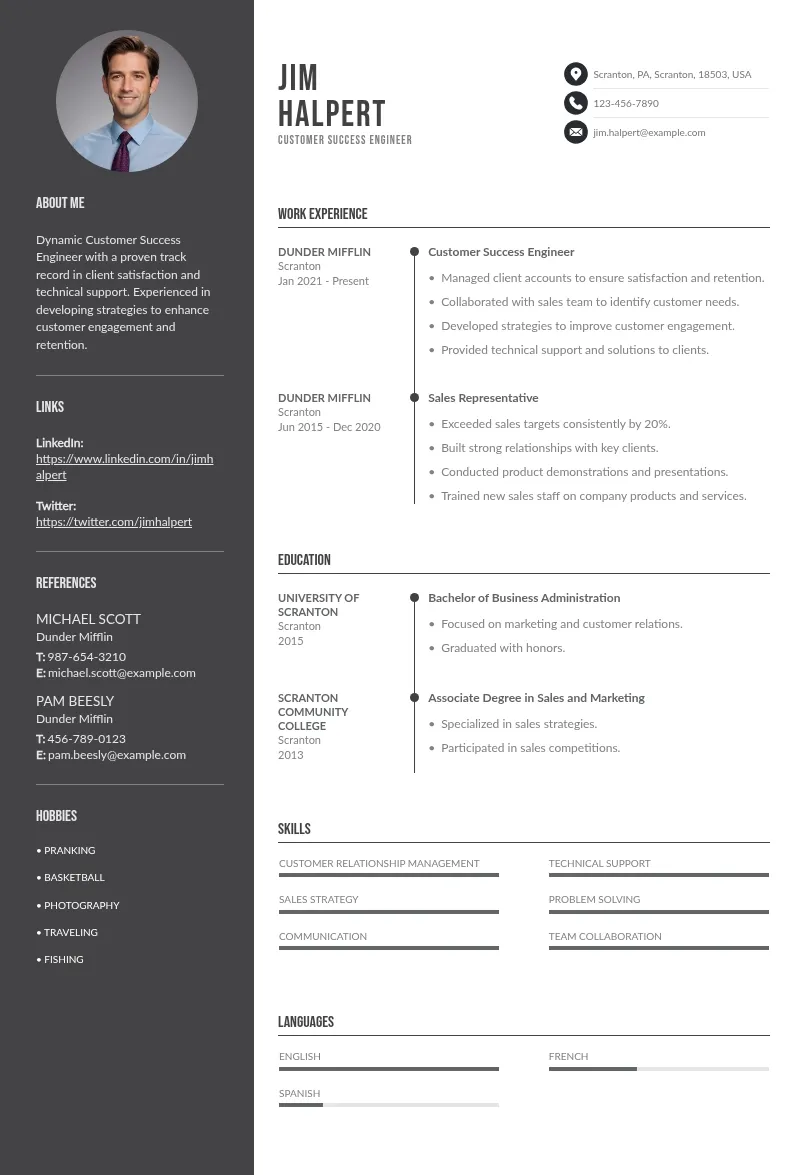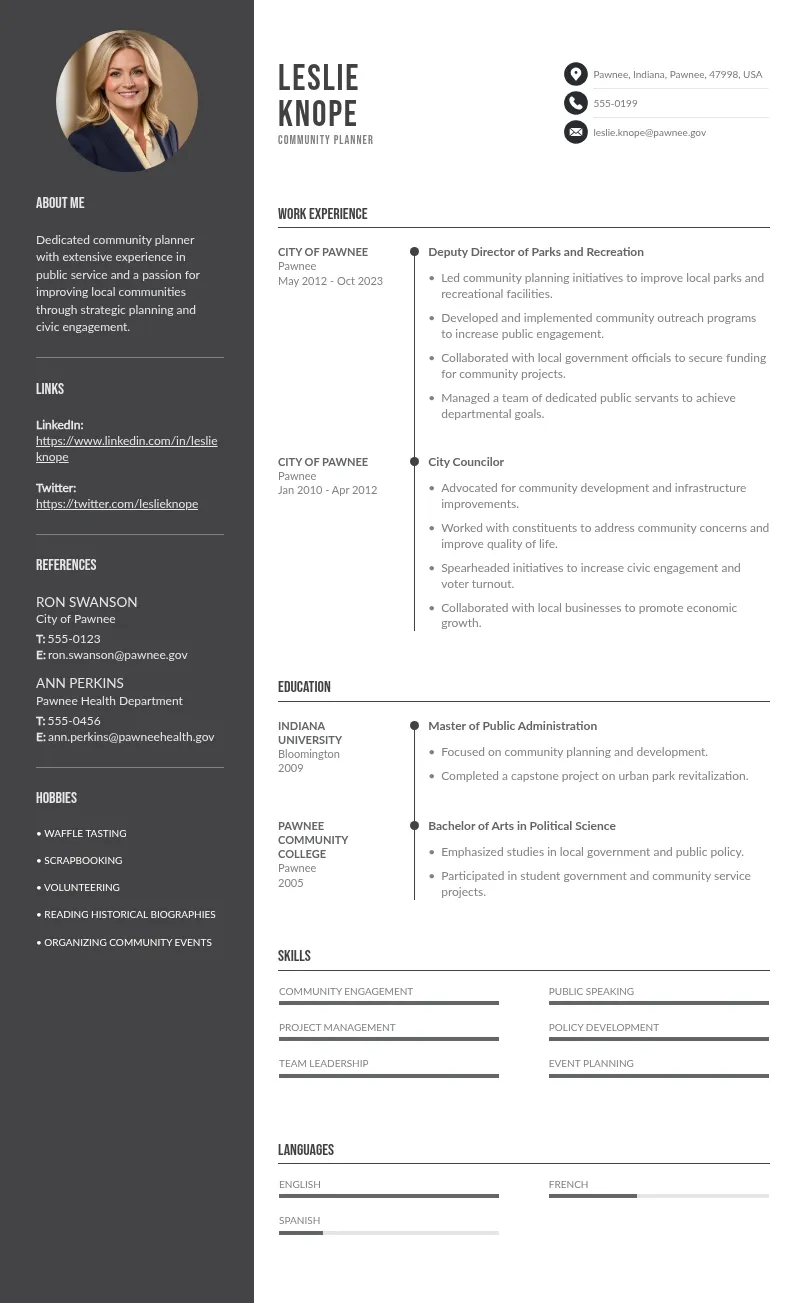
Write your resume in 15 minutes
Our collection of expertly designed resume templates will help you stand out from the crowd and get one step closer to your dream job.


It depends on your role, the timing, and whether their departure impacts your team or projects. If it directly affects you or your workflow, then yes, you can speak up. But if it doesn't and it’s not your news to share, it’s usually best to let it slide.
When It Might Make Sense to Speak Up About a Coworker Quitting
In specific situations, keeping a secret of a coworker quitting could cause bigger problems for you or the company. Here are three situations when it makes mores sense to speak up before they've handed in their resignation letter:
1. Their Exit Affects You Directly
If you work closely with this coworker at your current company and their departure would affect a shared project, timeline, or client, your boss might need to know sooner than later. In this case, you can let your coworker know you're planning to give your boss a heads-up about how things might shift.

2. There Are Ethical or Legal Implications
If your coworker is quitting to take a new position for a direct competitor and is taking confidential information, data, or client contacts with them, that’s no longer just a personal decision, it’s potentially a legal issue.
Most companies have strict confidentiality agreements or non-compete clauses in place. These agreements are designed to protect proprietary data, client relationships, pricing strategies, trade secrets, and business plans. If your coworker is violating any of these terms, your silence could make you complicit, or at least raise questions later.
3. The Coworker Has Asked for Your Help Informing Management
This situation is rare, but it does happen, especially if your coworker is nervous or unsure how to approach their resignation. It can also be that the coworker believes they are dealing with a bad boss and are overwhelmed by the situation. If they ask you directly for help telling your boss, and you feel comfortable doing so, it’s okay to assist as long as it’s clear you have their full permission.
Here’s how to handle it professionally:
- Get clarity upfront: Ask them exactly what kind of help they need. Do they want you to join the conversation with the boss? You don’t want to guess or accidentally misrepresent their decision.
- Stick to facts, not feelings: If you're passing on the message, be clear and neutral. For example: “Sam asked me to let you know they’ve accepted another job opportunity through a career coach and plan to speak with you directly by the end of the day.” Avoid speculation or explanations.
- Encourage a direct conversation: Unless there’s a genuine reason they can’t speak to management themselves, gently encourage them to take that step.
- Set your own limits: If you’re not comfortable delivering the news yourself, it’s okay to say no. You can still be supportive without being the messenger.
When You Should Not Tell Your Boss
In most cases, it’s best to keep the information to yourself, at least for a while. Here’s why:
1. It’s Not Your News to Share
Unless your coworker is doing something harmful or dishonest, their job search and career decision is their private business. Announcing their resignation for them can strain your working relationship and affect your reputation. Respecting boundaries in the workplace is professional etiquette and helps maintain good relationships and shows emotional intelligence.
2. You Could Damage Trust
People remember who kept their confidence and who didn’t. If you tell your boss before your coworker is ready, you might be seen as someone who betrays trust. Trust is a long-term asset in your career, and once lost, it’s hard to earn back, from former bosses and former co workers.
3. It Might Not Be Final Yet
Sometimes people talk about quitting for personal reasons but don’t follow through. Maybe they’re just frustrated or testing the waters. If you tell your boss and the coworker changes their mind, it could create unnecessary drama. Acting on uncertain information can create confusion and may reflect poorly on your judgment.
4. You Could Get Pulled Into Office Gossip
Once that information is out, you risk becoming part of the office rumor mill. It can be uncomfortable, and it might even backfire on you professionally. Being seen as a reliable, discreet colleague often leads to stronger career opportunities and respect from leadership.
How to Respond When a Coworker Tells You They’re Leaving
So you’ve been told a coworker is leaving. Now what? Here's how to handle it professionally:
1. Stay Supportive, but Neutral
Thank them for sharing and keep the tone positive. Don’t get pulled into venting or gossip with other coworkers. Just listen and stay neutral.
2. Ask What They Want
It's fair to ask: “Are you telling close colleagues, or would you prefer I keep this private for now?” That gives you clarity and shows professional courtesy and respect.
3. Don’t Spread It Around
Resist the urge to share it with anyone else at work, even your closest work friend. Keep it confidential unless you have clear permission to share it. Gossiping can quickly create a toxic environment.
4. Start Preparing Quietly (If Needed)
If their departure will impact your tasks or current job, you can start documenting shared processes or checking in with your manager about coverage without mentioning any names.

What To Do If Your Boss Asks You Directly
Now things get tricky. If your boss looks you in the eye and says, “Do you know if [Coworker] is planning to leave?” you need to tread carefully.
1. Don’t Lie
Never lie outright. That can harm your credibility. If you truly don’t know what’s happening behind the scenes, it’s okay to say, “I’m not sure.”
2. Be Vague but Professional
You can say, “I think they’re still figuring things out,” or “That’s probably something they should speak to you about directly.” This keeps you honest without overstepping.
3. Encourage Direct Conversation
If you feel comfortable doing so, you could tell your coworker afterward: “The boss wants to briefly talk to you. You might want to check in with them soon.” That helps move things along without you taking responsibility for their decision.
Final Thoughts
Being told a coworker is quitting can feel like holding a secret you didn’t ask for. But that doesn’t mean you’re stuck. Stay professional, protect trust, and think about the impact on your own work. When you handle it with tact and calm, you protect both your working relationships and your own reputation. Keep things respectful, honest, and focused on your role, not theirs.

















